- Home
- Patricia McLinn
Reaction Shot (Caught Dead in Wyoming, Book 9) Page 4
Reaction Shot (Caught Dead in Wyoming, Book 9) Read online
Page 4
Without that I’m not sure I would have heard anything deeper in his tone. “Because my great-great-grandparents started this ranch and built that house, my great-grandmother planted those roses, and my grandmother tended them until the day she died.”
“This… this is your family ranch.”
Chapter Seven
I stumbled over the words and felt as if I’d nearly stumbled physically, too.
Or possibly blundered. Right into his past.
The huge house he lived in and its surrounding substantial acreage, which he leased to nearby ranchers, were purchased with earnings as an NFL player with the Chicago Bears, supplemented by good investments. I knew that.
I also knew he’d grown up on a struggling family ranch that his father sold.
Leaving that family ranch had broken his boy’s heart. It had nearly broken his relationship with his father, too, though that seemed to have improved, if not completely healed.
He had never told me the family ranch’s name, never detailed its history, never indicated what part of the county it was in, even.
One other fact I’d known about Mike’s family ranch was it was broken up when his father sold it, so it no longer existed as a ranch for Mike to buy back with his football money, instead of the one he had now.
Standing here, on what had once been Paycik land, it struck me I didn’t even know if he’d tried.
“This was part of the family place.” The care he took to make his answer offhand undercut the attempt.
“This was where you grew up?”
“Here? No.”
His emphatic dismissal struck us all as funny.
One of those moments that wasn’t truly funny, but with the group reacting as if it were, it became funny. And relieved the tension.
When we were done laughing, he said, “It didn’t look quite this bad then, but no, our house — and the place where my grandparents lived when they got older — is over that ridge.” He pointed to the southeast. “Grandma came back to fuss with the roses almost every day. They were really rare around here when they were first planted and surviving like they have…”
“They’re amazing.”
They also explained Tamantha’s comments about picking flowers here with Mike’s permission. The ranch had been sold, but to some the roses still belonged to the Paycik’s.
“Yeah. Most days Grandpa came back with her. They left some of their things here, including an old record player and records. With the wind right, you could hear the records playing, and they’d dance together on the porch. I watched them a few times until Mom caught me.” His faint smile faded and he cleared his throat. “Good to see the roses still here. Though the circumstances…”
Mike turned toward the crime scene, shutting the door on memories. Following his lead, so did we.
I saw Tom still in the company of Sergeant Shelton near a section of police tape fluttering busily.
They stood in earnest conversation at the western side of the police tape enclosure, facing away from us. With any luck, that would continue.
Small groups of civilians dotted the northeast curve of the police tape ring. More men than women. They wore cowboy hats — the majority — or ball caps, shadowing their eyes from the bright sun.
“Grazing association members?” I asked with a nod toward that group.
“A lot of them are. Not all,” Diana said.
I recognized a few from events around the county, including a search for a missing man last fall. One who’d been involved in that search, though, I’d already known.
Plus, he wasn’t part of the group. He stood just inside the police tape under the watchful eyes of two deputies, Richard Alvaro and Lloyd Sampson.
He was a rancher named Hiram Poppinger, widely known as an eccentric. When Cottonwood County, Wyoming, calls you eccentric, that’s saying something.
It was his battered ranch pickup I’d recognized.
Inside the tape, the screening cut off the view from north to south. Whatever it masked — and it was a pretty good guess it included a body — was in an otherwise open area.
“Is Hiram Poppinger in the grazing association?”
“Yep,” Mike said.
“Yet, he’s been separated. And look where his truck is.”
“Inside the crime scene. He found the body?” Mike suggested.
I moved slightly closer to Hiram and his escorts, not directly facing them, showing no overt interest.
Even without looking at him, I had an image of a bright reddish-orange vest encasing Hiram’s torso — startling the eye against his otherwise subdued, if not downright drab attire — burned into my retina. Somehow, it suited him. It reminded me of portraits of men in the American Revolutionary era with their button-straining waistcoats. In those times, a pot-belly indicated the wearer’s wealth — enough to eat to develop a potbelly — and I found that subtle bragging rather endearing.
I put aside Hiram’s sartorial choices and shuffled another foot closer.
This could get tricky.
Not only to avoid attention from Alvaro and Sampson, plus Tom and Shelton, but now a third threat I’d spotted on the far side of the civilian group.
It was Needham Bender, publisher and editor of the local paper, the Sherman Independence.
I liked and enjoyed Needham as a person. I feared and respected him as a rival newshound. Especially because the Independence’s reporting in its twice-weekly editions frequently scooped KWMT-TV.
I didn’t want Needham zooming over here — which he would do if he thought I was on to something — and hearing anything Hiram said.
Of course, at the moment, I couldn’t hear Hiram.
“Mm-hmm. Hiram finding the body could explain a lot,” Diana murmured as she and Mike joined me in my new position.
In fact, Diana took an extra two steps toward Hiram.
Naturally, Mike and I had to do the same to hear her next words. “You know, this grazing association’s one of the county’s strongest.”
“Is it? That’s interesting.” No risk, no potential gain. I added two more steps. The trio inside the police tape came into range of my peripheral vision. “Out of all the grazing associations in all the counties in all the world for this to happen, huh? And there must be a good number of them in Cottonwood County.”
“There are.” Diana matched my steps and added another. “Lots cross county lines, too.”
“Ah,” I said softly as Mike and I joined her, because Hiram Poppinger’s voice was audible now.
Lloyd Sampson said something to Hiram, who cocked his head like a grumpy, alert, overfed robin in that reddish vest.
“Victim? Furman York’s no more a victim than a rattlesnake would be. And I’d sooner see him lying there dead than a rattlesnake. If anybody’s a victim, it’s me. Kept here all day, wastin’ my time when I got better things to do. Told you everything there is to tell.”
“You haven’t explained why you were in that building,” Sampson said. “If you took something and Furman York caught you—”
“Him? Catch me stealin’? Hah. Besides, what’s in there worth stealin’? You saw I don’t have none of those supplies they keep there in my truck.”
Richard Alvaro kept his voice too low to distinguish words.
Hiram spat in apparent disgust. Well away from any target, so he was behaving himself. “I already told you, I didn’t shoot him. Don’t know why Shelton’s got you two on me like white on rice.”
He received no response. That never bothered Hiram Poppinger.
“And takin’ my gun is damned high-handed. Officious, that’s what it is. I ain’t even fired my gun. Even fools like you can tell that and know I didn’t shoot that snake.”
A sound followed. That familiar, faint indrawn breath in preparation for someone to speak.
But no words came.
I caught movement in the farthest reaches of my peripheral vision. Without turning my head noticeably, I slued by eyes toward it.
&nb
sp; Richard Alvaro’s hand was retracting, while his fellow deputy’s arm was slightly rebounding, as if from being poked. Or lightly punched.
Interesting.
“Persecution, that’s what this is. I was the one as called you,” Hiram continued.
“You don’t get a gold star for that,” Alvaro said. “Calling law enforcement when you find a body is your responsibility as a citizen.”
“Could’ve walked away and pretended I didn’t see a thing and you couldn’t’ve proved otherwise, with him over here and in that bit of depression in the middle. If it hadn’t been for a glint off that gaudy buckle he wore, I wouldn’t have climbed up here and seen what I seen. Where he is, could be nobody’d’ve seen him for a long, long time. You’d’ve been dealin’ with a skeleton that wouldn’t get you any clues at’ll. You should be thankin’ me for lettin’ you get it fresh, so to speak.”
Neither deputy followed that suggestion.
“Should’ve known this is how it would be. Police, deputies, game wardens, you’re all alike. Makin’ life miserable for the ordinary citizen. You tell that Shelton that I won’t stand for none of his nonsense. You tell him—”
A new pickup arrived, distracting Hiram’s discourse.
Unlike the others, this pickup didn’t park at the end of the line. It drove up the center of the open lane to park right next to a sheriff’s department vehicle with a swirl of dust that sent tendrils into the civilian group. I caught a glimpse of the driver’s white hair.
“Him. That’s all this needed,” Hiram said. He spat again.
Neither words nor expectoration was necessarily a severe indictment of the new arrival. Hiram didn’t think much of humanity.
On first impression, though, I might be inclined to agree with him about this newcomer. Because the geometry of our positions meant his grand entrance drew unwelcomed attention to Diana, Mike, and me.
In fact, Tom and Shelton couldn’t look toward the newcomer without spotting us.
Maybe they’d be distracted enough by the pickup door opening and…
Nope.
Chapter Eight
Which burned hotter, Shelton’s scowl or Tom’s?
Tom’s. His aimed all at me. Shelton’s spread across the three of us.
Tom took half a step. Shelton held his arm, not physically stopping the other half a step, while advising against it.
The movement directed Hiram’s attention our way. “Them.”
His disgust drew looks from Alvaro and Sampson.
No sense trying to keep a low profile now. I started toward Hiram.
“You can’t talk to him.” Alvaro stepped in front of the much shorter rancher. “This isn’t the beginning of a beautiful friendship, breaking all the rules.”
Beautiful friendship? Breaking all the rules? What was he talking—? Oh. Casablanca? My reference to Of all the grazing associations, replacing Of all the gin joints…
I was impressed. First, he’d heard me. Then, he’d connected the reference.
“Elizabeth.” Tom made my name a reprimand.
“She’s fine,” I told him, knowing his main interest. “Tamantha’s with the Undlins, making doughnuts. In fact, we’re here on her orders.”
His scowl eased by a modest percentage at the last sentence.
Shelton’s deepened. “Now obey my orders and get out of here.”
“We’re behind the police tape, not interfering with your scene. Freedom of the press, Sergeant.”
“Doesn’t give you any right to be on private property.”
“Grazing association property,” I shot back. “Tom?”
Tom held my gaze a moment, adjudicating my appeal to his authority, then looked away. Following the direction of his gaze, mine landed on Hiram Poppinger.
“Tom’s worried about him.” Diana’s conclusion matched mine.
“Shouldn’t he worry about himself?” Mike muttered.
“Yes,” I said.
“He knows he didn’t do anything.”
Mike and I looked at Diana. She gave a slight nod, confirming the unspoken part of her comment would go something like, but he’s not entirely sure about Hiram, who might have gotten himself into a mess.
“If Hiram…” My part in this unspoken exchange added …did this and we start investigating, we’re not pulling punches to save him.
“Of course.” Diana’s nod emphasized her silent addition of Tom wouldn’t expect any different. And if you or anyone has doubt about… oh, anything… this clinches it. Because Tom’s more convinced Hiram didn’t do this than he is worried that he might be accused of it.
“Okay,” I said. Yeah, well, how about people worrying what he might be accused of? Not me. Other people. Like his daughter.
“I think I got that.” Mike took off his cowboy hat, wiped his brow and put it back on. “But I sure would like to go back over it.”
Diana patted his arm. “We will later.”
“Are you three done muttering over there?” Shelton demanded.
“No. But we’ll take a timeout.” I looked at Tom. “We left it in your court.”
“They can stay.” His straight, hard look added, But they better get something done.
I preferred Diana’s non-verbal communication to his.
“Thank you. Now, if we can ask a few questions—?”
“No,” Shelton snapped. “Alvaro, Sampson, move that tape. Get these people — these spectators — back.”
With the police tape putting us out of conversational range, I looked around and spotted Cagen, a reporter for the Independence, among a knot of people nudged back by the police tape. Leaning forward to see around a man with a potbelly, I searched for Cagen’s boss without success.
When I straightened, Needham stood beside me, watching with bright-eyed interest.
He knew exactly what I’d been doing.
“That was quite the get-together at Diana’s for your folks. Pretty much all the most interesting people in the county.” He considered for a beat. “The most interesting who aren’t entirely eccentric.”
“I didn’t think my parents were ready for what Cottonwood County has in the way of top eccentrics.”
He grinned. “Nice people, your parents. Can see a real blend of them in you. Proud as Punch of you they are.”
I knew they were. Sometimes, though…
That could wait for another day. One without a possible murder.
The sheriff’s department certainly treated the scene like a murder. Caution or a reason they weren’t sharing?
As if following my train of thought, he said, “Lean pickings on the information front, huh?”
“What do you know about this, Needham?”
“Like you, just got here. Wouldn’t think accident, based on this response.” He tipped his head toward the scientists behind the screening.
“Shelton told me once that Hiram Poppinger’s a lousy shot.”
“That screen’s not covering sniper distance. Wouldn’t need to be much of a shot.”
“What about the victim?”
“Dead man is Furman York.” I noticed he didn’t say victim. “Foreman of the Lukasik Ranch, which belongs to this grazing association.”
“Did you know York?”
“Wouldn’t say I did.”
“So, not a friend?”
He confirmed what I’d picked up in his careful words. “Wouldn’t say a friend, for sure.”
I turned to him. “What are you not telling me?”
“Lots.” He smiled. “For starters—”
Even before a voice interrupted Needham, he’d stopped, because his attention had gone to somewhere over my shoulder.
I turned, too.
Movement among pockets of observers outside the east end of the police tape caught my eye. Clumps coalesced, forming an identifiable center around one man, while maintaining ragged fringes of those not persuaded to be drawn in.
That one man had white hair combed back and flowing to his collar. The white h
air glimpsed from the late-arriving pickup, I guessed.
He was tall and thin. Tall, with more of the height coming from his legs and neck than most people. Thin, of the kind that gave me the impression I could see the ridge of his femur press inside against loose-fitting jeans. The sort of bony thinness of Abraham Lincoln that brought to mind the word gaunt.
Not that he otherwise reminded me of Lincoln. That honor belonged to Tom. And, coming from Illinois, I know my Lincoln.
With Lincoln, my attention went to his eyes. With this man, my attention went to his mouth, thin and wide.
“Norman Clay Lukasik,” Mike said in a low voice. He’d come up beside me when Needham and I shifted our attention to the newcomer. “Furman York worked for him. Though you could say it started the other way around.”
I’d heard Lukasik owned a major ranch. He was a defense attorney. He’d long been in demand around the region for high-profile cases. Frequently with the kind of client that made you think, “Who on earth would defend him?” Or, not to be biased, her?
Before I could ask Mike how and why Lukasik had worked for York, the lawyer raised his voice to courtroom levels.
“Furman York was not a happy man. Despite all the tonics here of open spaces—” His long arms spread wide. “—blue sky—” Those arms now stretched up as if he held the blue heavens aloft. “—and good companionship.” He encompassed the gathering with one sweeping arm. Then, with a glint that invited his viewers to join the joke, he swept the other arm, indicating cattle in a nearby field.
A few chuckles rumbled briefly, then faded.
With their fading drawing away any element of levity, Lukasik solemnly continued in a low, throbbing voice, “We shall all hope that his eternal rest brings him the peace he, sadly, seemed to lack in life.”
No one joined his hope by word or gesture, though shifting of work boots raised the dust to a level that might indicate discomfort.
As if unaware of the reaction, which I doubted, Lukasik raised his voice again. “This is abominable. For a man’s body to be left on the dirt like an animal. I demand he be accorded the respect that would be given to an animal.”

_preview.jpg) Almost a Bride (Wyoming Wildflowers Book 1)
Almost a Bride (Wyoming Wildflowers Book 1)_preview.jpg) Prelude to a Wedding (The Wedding Series Book 1)
Prelude to a Wedding (The Wedding Series Book 1)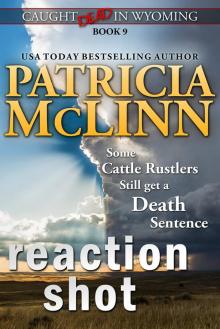 Reaction Shot (Caught Dead in Wyoming, Book 9)
Reaction Shot (Caught Dead in Wyoming, Book 9)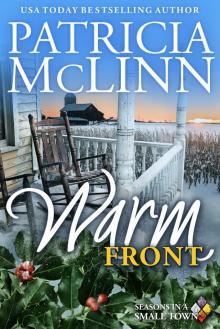 Warm Front
Warm Front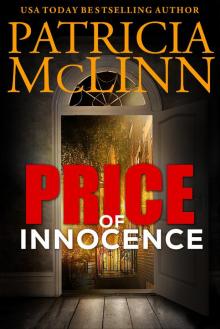 Price of Innocence
Price of Innocence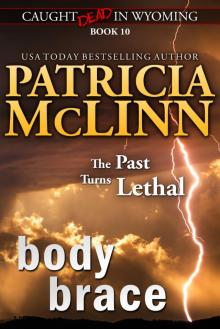 Body Brace (Caught Dead in Wyoming, Book 10)
Body Brace (Caught Dead in Wyoming, Book 10)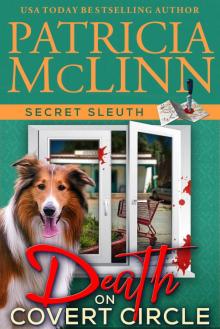 Death on Covert Circle
Death on Covert Circle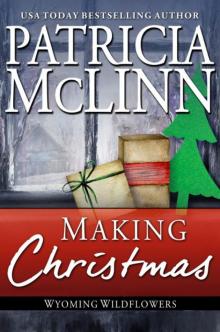 Making Christmas
Making Christmas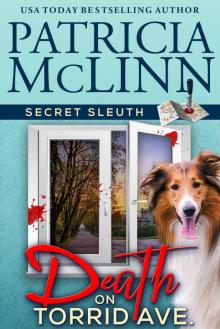 Death on Torrid Ave.
Death on Torrid Ave.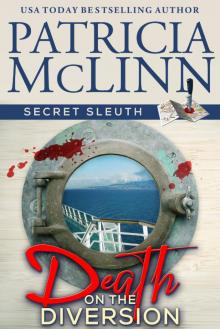 Death on the Diversion
Death on the Diversion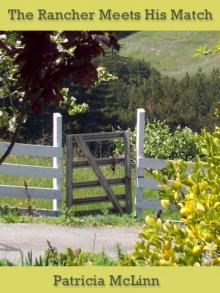 The Rancher Meets His Match
The Rancher Meets His Match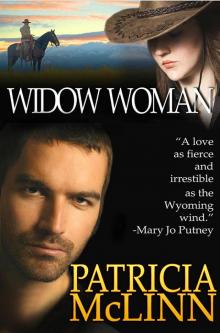 Widow Woman
Widow Woman The Runaway Bride
The Runaway Bride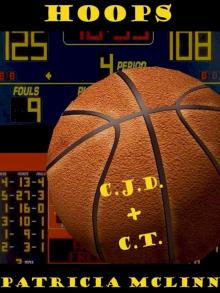 Hoops
Hoops A Stranger in the Family (Book 1, Bardville, Wyoming Trilogy)
A Stranger in the Family (Book 1, Bardville, Wyoming Trilogy)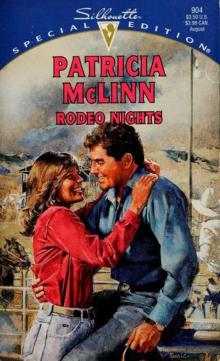 Rodeo Nights
Rodeo Nights Wedding Series Boxed Set (3 Books in 1) (The Wedding Series)
Wedding Series Boxed Set (3 Books in 1) (The Wedding Series)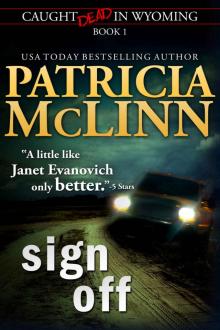 Sign Off (Caught Dead in Wyoming, Book 1)
Sign Off (Caught Dead in Wyoming, Book 1) Prelude to a Wedding
Prelude to a Wedding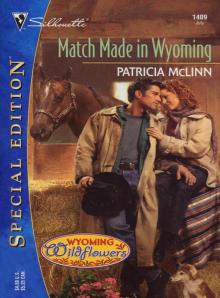 MATCH MADE IN WYOMING
MATCH MADE IN WYOMING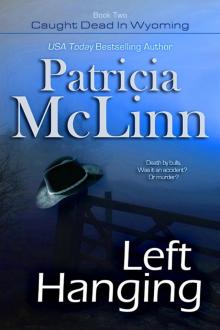 Left Hanging
Left Hanging What Are Friends For?
What Are Friends For?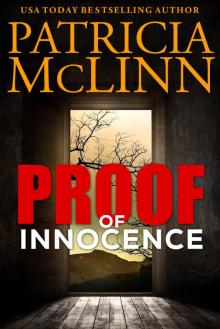 Proof of Innocence
Proof of Innocence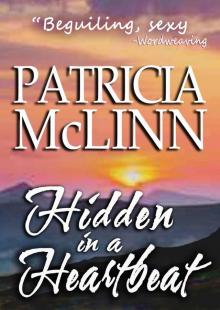 Hidden in a Heartbeat (A Place Called Home, Book 3)
Hidden in a Heartbeat (A Place Called Home, Book 3) Baby Blues and Wedding Bells
Baby Blues and Wedding Bells Least Likely Wedding?
Least Likely Wedding? Heart Stealers
Heart Stealers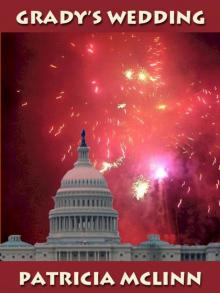 Grady's Wedding
Grady's Wedding Right Brother
Right Brother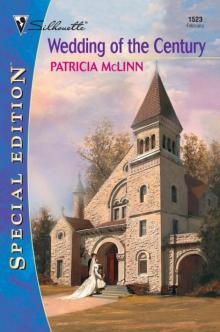 Wedding of the Century
Wedding of the Century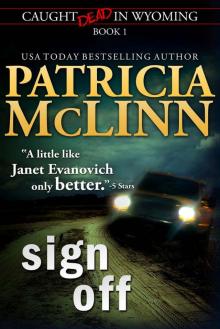 Sign Off
Sign Off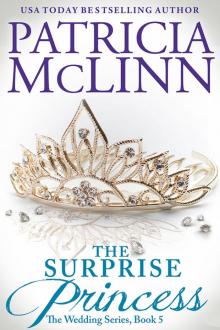 The Surprise Princess
The Surprise Princess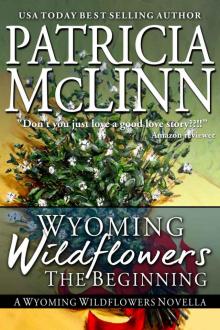 Wyoming Wildflowers: The Beginning
Wyoming Wildflowers: The Beginning